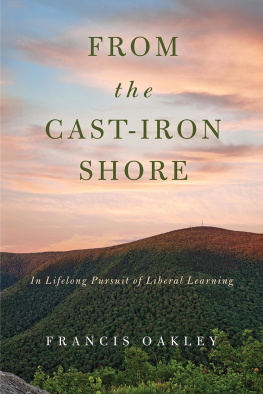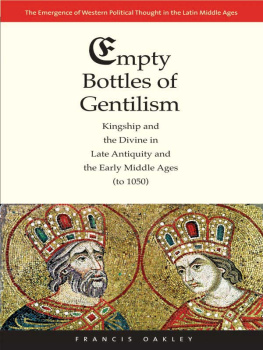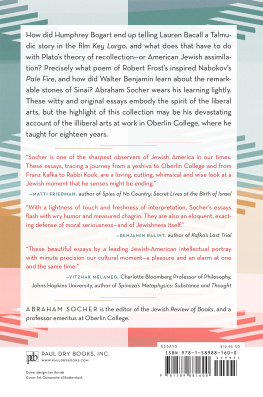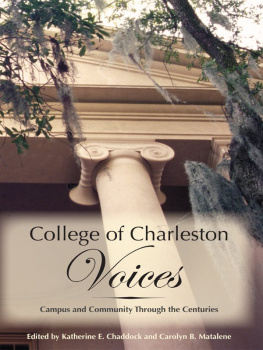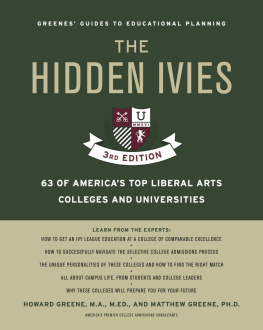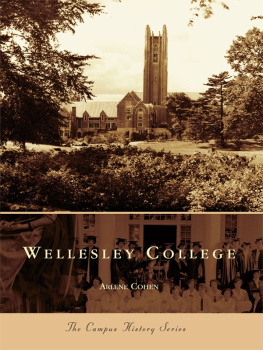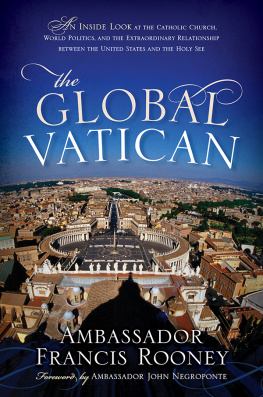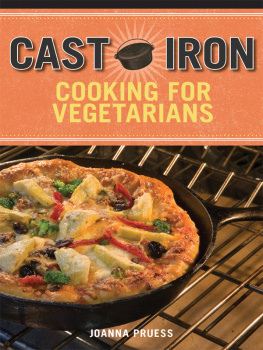Landmarks
Page-list
ACKNOWLEDGMENTS
For their kindness in reading over one or another version of the manuscript of this memoir and giving me the benefit of their encouragement and advice, I am much indebted to my daughter, Deirdre Oakley, and to my friends and colleagues at WilliamsJohn Chandler, Dusty Griffin, Kenda Mutongi, and Dan OConnor. Similarly to the fellows of the Oakley Center for the Humanities and Social Sciences at Williams, with whose weekly seminar I ventured to share a couple of chapters, and to Krista Birch, administrative director of the Oakley Center, for her generosity in extending a helping hand to one who, like the butler in Downton Abbey, did not quite come to terms with the telephone until his adult years and who still finds it a bit of a challenge to navigate the highways and byways of Computerland. To all of them I am most grateful, as also for the encouragement extended to me by the readers for the University of Notre Dame Press. Commonweal magazine gave me permission to incorporate in the chapter Trajectories of Fear material that first appeared under the title Luftwaffe over Liverpool in Commonweal 143, no. 2 (January 29, 2016). For permission to reproduce photographs they had taken, I am also indebted to Patrick Meyer Higgins, Charles Fuqua, and Leslie Reed Evans. And here, of course, I would be remiss if I did not once more, as with so many of my previous books, pay tribute to Donna Chenail for her fine work in preparing the manuscript for press. It has been, over the years, a great pleasure to work with her.
Williamstown, Massachusetts, January 2017 F.C.O.
CHAPTER ONE
The Secure Realm of BEFORE
Oh God, oh Jesus, oh Sacred Heart. Boy, theres two gentlemen to see you. These are the words that the Brendan Behan of Borstal Boy had his landlady screech up the stairs when the hard men of Special Branch showed up on the doorstep of his North Liverpool lodgings to take him into custody. In so doing, they moved quickly enough to preempt his frantic attempt to rid himself of a suitcase crammed with gelignite, detonators, and other incriminating paraphernalia associated with the Irish Republican Armys 1939 bombing campaign in England. This launched him, at the age of sixteen, on the trail that was to lead him to time in Walton Jail, arraignment in court, trial, sentencing to several years in Borstal (juvenile reform school), eventual expulsion from England, and the launching of a successful literary career. That 1939 campaign is forgotten today almost as totally as is the subsequent IRA campaign of raids in the 1950s on British military installations in England and Northern Ireland with the object (sometimes embarrassingly successful) of seizing arms and ammunition for use in future assaults on the hated imperial establishment. And yet, as I now realize, it was a remarkably extensive campaign, generating apprehension and alarm in a whole series of English cities from London to Manchester, Birmingham, Liverpool, and Coventry, and inevitably stirring up, so far as English attitudes towards the Irish were concerned, a renewed wave of anger, fear, and loathing. Tear gas bombs precipitated panic in cinemas; in London, railway and Tube stations were damaged by explosions; in Manchester and Liverpool, power lines, bridges, jails, and other public buildings were targeted. Among the worst incidents were a bombing in Coventry that went awry, injuring some sixty bystanders and killing another five, and a massive explosion in Liverpool that totally destroyed the Central Post Office on Mount Pleasant.
In 1939, at the time the sixteen-year-old Behan was apprehended, we were living across town in the South Liverpool suburbs and the post office incident is firmly embedded among my early memories. It is so less, I think, because of the event itself, however dramatic it must have been, than because of the sotto voce anxiety my parents unwittingly conveyed to their offspring, worried as they were about the degree to which such unhappy goings-on could stir up rancid anti-Irish sentiment once more. And their anxiety, as I was later to discover at elementary school, was wholly warranted. For we were an Irish family, perhaps the more self-consciously so because we bore an English surname. My siblings and I had been fated to grow up in England rather than Ireland simply because my father, at a time of high unemployment in both Britain and the Irish Free State, had been fortunate enough to have been offered the job of assistant foreman in the packing and shipping department of a bobbin and shuttle factory that served the needs of the Lancashire and Indian cotton mills. He knew a lot about timber and was a known quantity because his fathers sawmill had earlier shipped timber to that factory. It was situated in Garston, at the most southerly end of the complex of docks stretching along the tidal waters of the Mersey estuary navigable by ocean-going vessels. To that factory he rode his bike six days a week, and they were long days beginning at 6:30 in the morning. But he had a family of six to support and counted himself lucky to have the job at all. Of his four children, one girl and three boysMolly, Vincent, Noel and II was the youngest. And while I had been born in Allerton, a place that was later to emerge as Beatles or, at least, Lennon-McCartney territory, my parents had subsequently moved into another council (that is, municipally-funded rental) house in the neighboring borough of Garston. It was a somewhat more gritty area than Allerton and, in the infinitely subtle social gradations embedded in the working and lower-middle class pecking order of the day, the address was (socially-speaking) a less desirable one. In effect, it suffered from what my urban sociologist daughter now tells me is known in her business as territorial stigma. But the house was slightly bigger than the Allerton one and it had the further advantage of being within reasonable walking distance of our Catholic parish church and its affiliated elementary school on which our lives were very much centered, and it was also closer to my fathers place of work. Moreover, territorial stigma notwithstanding, on clear days the front garden afforded to us coastal flatlanders a faraway and beckoning glimpse of the mountainous ramparts of the Clwydian Range in Flintshire, rising up beyond the River Dee in North Wales, with the summit of Moel Famau looming, remotely mysterious, in the center.
Immigrant, I suspect, was a term that my mother and father would have found offensive had it been applied to them. Until overtaken by the years of war they still thought of themselves, I sense, as just being here for a while and as destined, sooner or later, to go home. Certainly, we children were all taught, if pressed on the matter, to describe ourselves as Irish and proud of it, and that identity we took very much for granted. But what exactly it meant was far from being clear. We were called upon in effect, and however unwittingly, to navigate the muddied cultural waters and complex cross-currents of the Irish diaspora in England, and our task was made the more challenging by the fact that our father and mother were themselves very different kinds of Irish people. My father, Joseph Vincent Oakley, was a small-town product. He came from Athlone in County Westmeath, which was by virtue of its strategic location on the River Shannon a military garrison town, constituting the halfway crossing point for the principal road and railway connections linking Dublin in the east to Galway in the west. He had Protestant relatives somewhere in the neighborhood of Cork, and his family, though hardly of the ascendancy class, was certainly of Anglo-Irish stock. His branch of the family had, it seems, gone native in the early 1800s by embracing Catholicism, the precipitating factor being the remarriage of a widowed ancestor, William Oakley by name, to a Catholic woman. While the family produced some schoolteachers over the course of the nineteenth century, their normal engagement appears to have been in some type of small business. My paternal grandfather followed along in that track, operating a small sawmill that cut, processed, and shipped out timber harvested largely on the Clanricarde estates that reached down to the Shannon from the west. And my father, one of the older sons in a family of twelve, worked in that enterprise (for little more, it seems, than pocket money) into his twenties, when the firm itself went bankrupt. Having learned to drive, and not lacking entrepreneurial instincts of his own, he embarked then upon the operation of a livery service in the Irish midlands, combining that enterprise, for they were clearly a very musical family, with what was advertised as the Oakley String Band, which provided incidental music for silent films and played for dances throughout the same regionAthlone and Roscommon, Tullamore and Mullingar. The band was, in fact, no more than a trio composed of himself on the cello, his younger brother Paddy on the violin, and his sister Florrie on the piano. And his last job in Ireland, which came to an end with the establishment of the Irish Free State in 1922 and the departure from Athlone in February of that year of the long-standing British garrison, was as a civilian employee of the British Army working, I believe, for the quartermasters office in charge of stores. And it was in Athlone, I think, that he met my mother, a junior civil servant whose assignment at that time was that of secretary to the British Army officer commanding the Athlone garrison.

